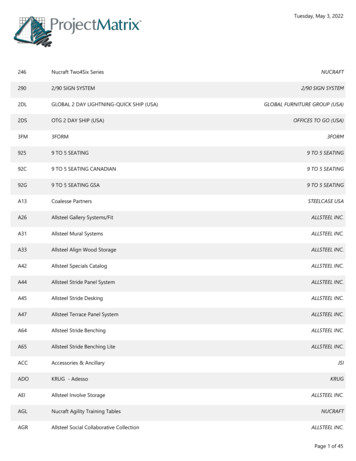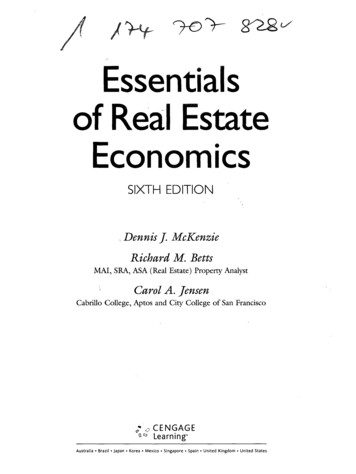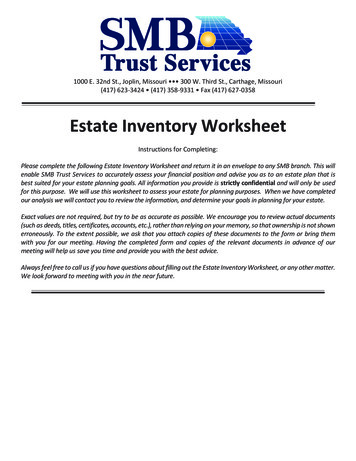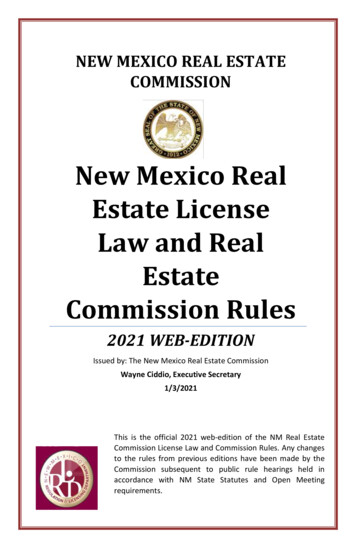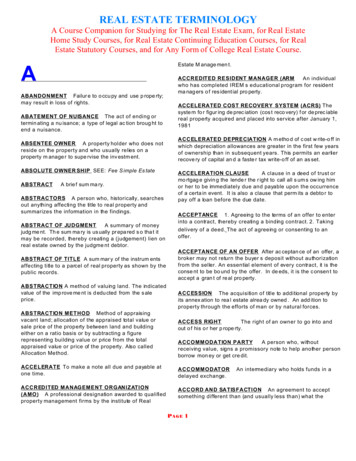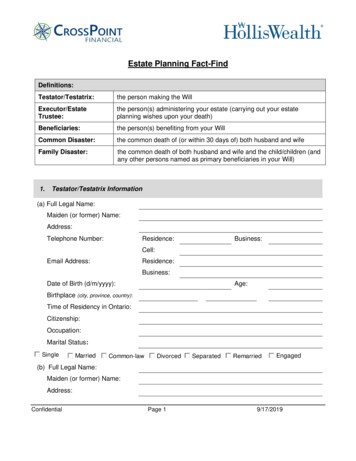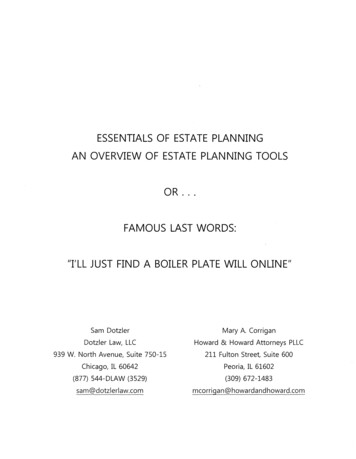
Transcription
ESSENTIALS OF ESTATE PLANNINGAN OVERVIEW OF ESTATE PLANNING TOOLSOR .FAMOUS LAST WORDS://I'LL JUST FIND A BOILER PLATE WILL ONLINE/ISam DotzlerMary A. CorriganDotzler Law, LLCHoward & Howard Attorneys PLLC939 W. North Avenue, Suite 750-15211 Fulton Street, Suite 600Chicago, IL 60642Peoria, IL 61602(877) 544-DLAW (3529)(309) d.com
ESSENTIALS OF ESTATE PLANNINGAN OVERVIEW OF ESTATE PLANNING TOOLSOR .FAMOUS LAST WORDS:"I'LL JUST FIND A BOILER PLATE WILL ONLINE"TABLE OF CONTENTSPresentation . 1Form-Estate Planning Personal Information Fact-Finder . 26Form-Last Will and Testament . 36Form-Revocable Trust for Single Person . 57Form-Power of Attorney for Property . 70Form-Power of Attorney for Health Care . 81Form-HIPAA Release . 91Form-Declaration of Living Will . 93
What is "estate planning"?In short, estate planning is the process of thinking about your goals andobjectives as they relate to your assets, your health care, your children and yourfamily and culminates in the signing of a series of documents that will implementthese wishes. More particularly:1.As it relates to your property, youplan for the accumulation,management and ultimate distribution of your assets (a.k.a. your"estate") and consider estate tax and generation skipping transfer taxissues.2.As it relates to your health, you make certain decisions relating to yourhealth care such as who will make decisions for you if you are unableto, how much authority you want to give those people and whetheryou want to authorize organ donations.3.As it relates to your children, you name the people who will care foryour minor children (or your adult children who are disabled) if you areunable to.4.Additional estate planning goals are, among other things, to (a) avoidthe probate court system, (b) provide for asset management if youbecome incapacitated, (c) carry out your charitable wishes, etc.During the estate planning process, you will contemplate these issues andmake decisions based on your personal goals and beliefs, your family and yourassets.You have an "estate plan" when you sign a set of documents (discussedbelow) that will carry out these goals and beliefs.1
Why do I need an estate plan?Your estate plan is your only opportunity to control the disposition of yourassets, provide a set of rules for your health care decisions, and name the peoplewhom you trust to handle these matters. In other words, your estate plan is whereyou set out the rules and choose your referees to best minimize the chances of afuture disagreement.A core estate plan is generally made up of the following five (5) orSIX(6)documents:1.Last Will and Testament (sometimes incorporating a //Testamentary Trust//);2.Health Care Power of Attorney;3.Living Will (a health care directive not to be confused with a Last Will andTestament);4.HIPAA Release;5.Power of Attorney for Property; and6.Revocable Trust (optional).The Last Will and Testament (the "Will")What is a Last Will and Testament? A Will (different from your //Living Willi/ whichis a health care directive discussed below) is the written declaration of, among otherthings, your intentions for the disposition of your assets upon death.A Will isenforceable ONLY at death and may be changed at any time during your life while11you have Capacity11 Generally (very generally), llcapacityll requires that you know2
your family ("the objects or heirs of your bounty") and the general nature and extentof your assets.What does a Will do? A Will, among other things:1.distributes your assets to the people (or organizations) you choose, in theamounts and manners you want;2.can establish a Testamentary Trust (a Trust built into your Will that onlycomes into existence upon death -we will come back to this);3.can delay the distribution of a minor child's inheritance until a later time;4.can include provisions for the care of a disabled adult child;5.names guardian(s) for minor children;6.names an executor to handle your estate matters;7.can take advantage of estate tax strategies;8.can exerc1se a power of appointment, if one exists and it makes sensegiven the nature and extent of the recipients assets; and9.waives expensive and unnecessary surety expenses.What does a Will not do? Among other things, a Will does not:1. Dispose of property held in joint tenancy or tenancy by the entireties withanother party. For example, if a husband and wife own their home in jointtenancy or as tenants by the entireties, upon the death of the first spouse,3
ownership of the home automatically passes to the surv1v1ng spouse.Note that tenants in common can designate someone other than asurviving joint tenant to take their interest upon death, and accordingly, aWill can enable a tenant in common to distribute their interest upondeath;2. Dispose of property to which a beneficiary designation is attached (i.e. lifeinsurance policies and retirement assets). For this type of asset, what youstated in your Last Will and Testament is irrelevant and the individualdesignated in a beneficiary designation will receive the asset;3. Dispose of property held in trust for your benefit (unless the trust givesyou a power of appointment that can be exercised in a Will).4. Dispose of property held1na Revocable or Irrevocable Trust created byyou.What happens if I don't have a Will? If you die without a Will, you are said tohave died "intestate" and the state provides a Will for you. Your property (that isproperty held in your. name alone) will be distributed to your "heirs" according tostate law (i.e. intestacy laws). The state will determine who your heirs are and theapportionment of your property to those individuals.Intestacy law in Illinoisattempts to give your property to your closest relatives, beginning with your spouseand children. If you have neither a spouse nor children, your grandchildren or yourparents will get your property. This list continues with increasingly distant relatives,including siblings, grandparents, aunts and uncles, cousins, and your spouse'srelatives. If the court exhausts this list to find that you have no living relatives byblood or marriage, your property goes to (or "escheats" to) the state.To rely on the state intestacy laws is to take a significant gamble on thedistribution of your assets. Not only do the laws split up your assets differently than4
you might reasonable expect (see below), but the process is more cumbersome andcostly for your family.Often times, intestacy laws do not distribute your property the way you wouldexpect. For example, if you are married or in a civil union, you, like most, likely wantyour assets to pass to your spouse upon death, and if your spouse predeceased you,then to your children. However, the State of Illinois only lets this happen if you signa Will.Without a Will, in Illinois, if you are married or in a civil union and havechildren at the time of your death, your property will be divided between yoursurviving spouse and your children . it will not simply go to your spouse. One-halfof your estate will go to your spouse and the other one-half will be split equallyamong your children to do with what they please [if they are over eighteen (18)years old].Also, if your children are under age eighteen, a minor's estate will beopened for each child under eighteen and the guardian will report to the courtregularly. In this case, the surviving spouse will be unable to access the children'sshare to use for his or her own health, maintenance and support without having togo to court and prove to a judge that it is in the children's best interests to use thechildren's share for such purposes.If you are not married or involved in a civil umon, but you wish to benefitsomeone other than your legal heirs, you must execute a Will or make otherarrangements for assets to pass to the individual(s)Furthermore, if you fail to execute a Will, you will be unable to select theguardian for your minor children. A judge will have to make the decision about whowill act as your minor children's guardian without knowing your wishes.Sometimesfamilies can agree and there is no problem, but many times families that agreedwhile you were around find cause to disagree upon your death.Additionally, insituations involving divorced parents, a Will that designates a guardian for thebenefit of a minor child can be particularly important. Without a Will, you are takinga gamble that things will just work out.5
In addition to the unintended consequences above, dying without a Will costsmore and is more difficult to administer. Without a Will, your executor will need a"surety" bond.What is surety?Every executor has to personally guarantee thefaithful performance of his or her duty to your Estate. This is called the executor's"bond.'' A Will can waive the need for this bond. If there is no Will, or if the Willfails to waive the bond requirement, the bond must be insured by obtaining aguarantee from 2 sureties acceptable to the court or by purchasing a guaranteefrom a surety company. Since the need for surety is mandatory if not waived by aWill, the market for surety bonds is captive, and the cost is high.Additionally, itmay be difficult for your Executor to find two individuals who are acceptable to theprobate court to serve as individual sureties. Accordingly, naming a trusted Executorand waiving a surety bond is far more efficient and less expensive to the Estate.Requirements to Execute a Will. For a Will to be valid in Illinois:1.it must be signed by the Testator (the person for whom the Will is for);2.1nthe presence of two "disinterested" witnesses (witnesses who are notnamed in the Will or related to the Testator);3.and the Testator and witnesses must sign in the presence of each otherand a Notary Public (if using a self-proving affidavit discussed below); and4.it is a good idea to have all of the parties execute what is called a "selfproving affidavit". This is a second set of signature pages where theparties, before a notary public, make certain statements as to the signing.This affidavit makes admitting the Will to court go much more smoothlyand eliminates the need to trackdown witnesses when the Will is filed(which may be necessary if there are any questions as to the validity of theWill - which we can never predict).6
Revocable Trust (aka Living Trust)What is a Trust?To oversimplify, a Trust is a bank account with rules - rules established todetermine who gets the assets, how much they can get, when they can get them,why they can get them and what happens when to those assets when thebeneficiary dies. In other words, a Trust establishes a structure to hold and manageassets for the benefit of its intended beneficiary or beneficiaries, providing rules forthe investment, distribution, distribution and successive management of the Trustassets.A Trust provides flexibility both during life and after death.It provides theability to respond and adapt to future circumstances by providing a vehicle to hold,manage and distribute your assets if you become incapacitated. Upon death, it cangive the beneficiary the ability to appoint the Trust assets to a limited class of otherbeneficiaries (you decide who the class of appointees will be, such as yourdescendants), which provides flexibility when the beneficiary of the Trust already hasenough of their own assets. Trust protector provisions give a third party the powerto change the terms or ultimate distribution of the Trust.A Trust can also be used to, among other things, segregate assets for probateavoidance, minimize or delay estate or generation skipping transfer taxes, protectassets inherited by the beneficiaries, or manage and distribute a specific asset (e.g.family cottage).What does it do?A Trust provides numerous benefits both during your life and after your death- the benefits and flexibility of a Trust are virtually limitless. A Trust can help yourthat your wishes concerning your minor children are carried out, prevent the need7
for an adult guardianship estate, distribute your assets upon death, avoid probate,and provide tax benefits and asset protection.During your lifetime. There are a few major benefits of having a lifetime RevocableTrust (this distinguishes a Revocable Trust from a Testamentary Trust built into aWill).1.If you become incapacitated, with a Trust, your assets can be used for yourcare and support, without the inconvenience, expense and court oversightotherwise required by an adult guardianship proceeding.2.You can transfer assets into your Trust during life and name your Trust asbeneficiary of any life insurance policies and retirement accounts. This willensure that those whom you wish will receive of your assets in a Trust.3.Funding your Revocable Trust during life also avoids the need for aprobate estate before the court.4.If you are incapacitated during life, you no longer have the ability tomanage your assets and your family would need to open an adultguardianship estate to get control of your assets, manage them and usethem for your care and support.If you have a Revocable Trust and aPower of Attorney for Property (both parts of your core estate plan), youcan avoid the necessity of opening a costly and inconvenient adultguardianship. With a Trust, if you become incapacitated during life, youragent under your Power of Attorney for Property can transfer your nonTrust assets to the Trustee (e.g. your spouse or partner) of your Trust. TheTrustee can then use your assets for your benefit without having to open adisabled guardianship estate with the court.8
5.In addition to preventing the need for an adult guardianship estate, aTrust can ensure that ALL of your assets pass through the preferreddistribution scheme you set forth in your Will or Trust.For many, life insurance policies andretirement assets [IRA, 401(k), etc.]constitute a considerable portion of their wealth. The provisions of your Will do notgovern the disposition of these assets.Your life insurance policies and retirementaccounts pass by contract [the beneficiary designation you filled out when you firstgot the insurance policy or signed up for your 401(k) plan] to the beneficiary namedon those policies and accounts.For example, assume that the majority of yourassets are life insurance policies and retirement accounts. If the beneficiary on yourinsurance policies and retirement accounts were your brother (because your spouseor partner was not in the picture at the time you filled out the paperwork), thenyour brother would receive the assets from those life insurance policies andretirement accounts - not your spouse.For these assets, what you stated in yourLast Will and Testament is irrelevant and your brother, not your spouse, wouldreceive the bulk of your assets. A revocable Trust gives you the tool to prevent this.If you have a Revocable Trust, you can name your Trust as the beneficiary ofthose life insurance policies and retirement accounts. This will ensure that all of theassets payable from those policies and accounts are distributed in accordance withyour wishes and just like the rest of your assets.At Death. Upon death, a Trust acts as the mechanism to hold, manage and providefor the controlled distribution of your assets to the beneficiaries you have selected(e.g. your family, charities, friends, etc.).By passing your assets through a Trust,rather than outright under a Will) to your chosen beneficiaries, you can, amongother things:1.provide for the control and management of the Trust assets after yourdeath;9
2.make Trust assets less likely to be invaded by creditors and divorcingspouses of the Trust beneficiaries;3.give the beneficiaries access to Trust assets for their care and support orother purposes you see fit to provide for;4.keep the Trust assets from being included in the beneficiary's estate uponthe death of the beneficiary, thus avoiding estate taxes in futuregenerations;5.help keep the Trust assets out of court supervision m the event that abeneficiary is a minor or disabled adult; and6.avoid the probate process before the court if the Trust is properly fundedduring your life.Protecting Minor Children or Disabled Adults. A minor child or disabled adult doesnot have the ability to hold assets themselves.Unless their assets are inherited inTrust, their inheritance would need to be supervised by the court in a guardianshipestate. When a child turns eighteen (18) they gain full control and access to thoseassets. This is of some concern because even a mature eighteen year old may notknow how to properly manage a lump sum of money in a sustainable way.Creating a Trust negates the need for a children's or disabled adult'sguardianship estate to be opened upon your death (at least with respect to theassets that are inherited from you). It will also allow you to name a Trustee of yourchoice to manage the assets for and distribute them to your child beyond the ageof eighteen (18). When your children reach the age determined by you (this may be25 or 30 years old, or in the case of my kids, 75), they can become their ownTrustee.Allowing them to become their own Trustee, rather than distributing the10
assets outright at some age, helps protect the assets from creditors or a divorcingspouse.Moreover, a Trust can allow the Trustee to disproportionately distribute assetsto beneficiaries at different times based upon their individual needs.A Trust canreward those beneficiaries who achieve goals set by you, or it can withhold benefitsfrom a beneficiary while they are struggling with substance abuse.Probate Avoidance. By failing to execute a Revocable Trust during your lifetime, youcannot transfer your assets to (i.e. //fund//) the Trust during life. If the assets are inyour name upon death, your property will pass through probate upon your death.The probate process will delay the distribution of your assets and cost time andmoney.Executing and funding a Revocable Trust during your life will allow your Estateto bypass probate completely and your assets will flow through to your beneficiariesthrough Trusts per your wishes. The Trusts will then be protected and governed bythe rules you have established and using the Trustee that you have chosen.Controlled Distribution of Assets. If you do not have a Trust your assets will passoutright and free of Trust to your beneficiaries. When your assets pass outright toyour beneficiaries there is no longer any measure of control over the assets.assets can be used (or abused) in any way the beneficiary wishes.children, this may not be a concern, for others, it clearly is.uncertain and things change.TheFor someBut the futureISA Trust ensures that your wishes are carried out. Ifnothing else, it keeps the money out of the hands of that pesky son-in-law.A passed to those beneficiaries in Trust will be managed and distributed by aTrustee chosen by you until such time as you decide your children should gainmanagement and control of the Trust assets. It also allows you to determine whatthe Trust assets can be used for (e.g. education, health and support, but not lavish11
vacation).Not only does this allow for more control in situations such as theexample illustrated above, but it also offers a level of asset protection (see belowAsset Protection).Lastly, by creating a Revocable Trust you are able to bring of your assetsinto your Estate so that you may pass every asset to the person(s) whom youchoose in the way that you choose.In order to ensure that your retirement planassets and life insurance policies pass in accordance with your estate plan, you willneed to create a Revocable Trust and name that Trust as the beneficiary of suchplans and policies.Otherwise these assets pass to the beneficiaries of such plansoutright and free of trust.Estate Tax Benefits. While this is in no way an attempt to provide a crash course onthe estate tax regime at the Federal and state levels, some initial insight is helpful.Do I care about estate taxes? If you have less that 4 million (or 8 million with yourspouse), and these numbers are based on Illinois estate tax levels - the analysis isdifferent when adding in the Federal numbers as discussed later - then it reallydoesn't mean anything to you (however it might mean something to your kids ifTHEY ever attain a net worth that is taxable . we'll come back to that). If, however,you are fortunate enough to have a taxable estate, then a well-drafted estate planwill:1.maximize the amount you (and your spouse) can pass tax free;2.delay estate taxes that are ultimately unavoidable due to the size ofyour estate, until the death the death of a surviving spouse if you aremarried; and3.shelter the max1mum amount permitted from estate taxes for futuregenerations.12
Illinois is a "decoupled" state with respect to estate taxes.Both Illinois andthe Federal government impose an estate tax on your "taxable estate" upon yourdeath.In Illinois, an individual can pas 4 million to anyone they choose, free ofIllinois estate taxes (which means a couple can pass 8 million). Every dollar above 4 million (or 8 million for a couple with proper estate planning) is taxed at a rateof up to 16% by the State of Illinois.For Federal purposes, an individual can pass 5.25 million free of Federal estate taxes (which means a couple can pass 10.5million with proper estate planning). Every dollar above 5.25 million (or 10.5million for a couple) is taxed at a rate of up to 45% by the Federal government.So what does this mean- to those with over 4 million? If you do not have a Trust,you are may have some exposure (or even double exposure) to estate taxes. Whilea Will (without a Testamentary Trust built in) can delay estate taxes to the death of asecond spouse if you are married, any assets passing to the surviving spouse areadded to the surviving spouses estate, which could result in unnecessary taxation onthe inherited assets. If, however, a Trust were utilized, the assets could be passed toa surviving spouse (or any other beneficiary such as a child or grandchild) and up to 4 million in assets could be forever sheltered from Illinois estate taxes and 5.25million could have been forever sheltered from Federal estate taxes.Asset Protection. Assets passed under a Will go directly to the beneficiary, outrightand free of Trust.If the beneficiary is later sued or divorced, the inherited assetsmay be reached by creditors or a divorcing spouse or partner (inherited assets aretechnically supposed to be separate property, but they are often comingled and canbe subject to divorce proceedings).However, a Trust can help provide a layer of asset protection from creditorsand divorcing spouses. A Trust becomes irrevocable upon the death of the Grantorand will be held by a Trustee for the benefit of the named beneficiaries.Theresulting irrevocable Trusts may enjoy a level of asset protection making the assets13
exempt from creditors in a lawsuit or divorce.For the assets to be protected, theTrust must, among other things, (1) explicitly deny assets to creditors (a spendthriftclause) or a divorced spouse or partner; (2) avoid the landmines out there relating toTrustee such as interested Trustees, disinterested Trustees, the power to fire and ionstandardsutilizing"ascertainable standards" and "best interest" standards in light of the Trustees.Revocable vs. Irrevocable.If a Trust is "revocable," it may be changed or revoked by the grantor. If aTrust is "irrevocable," it cannot be changed or revoked by the grantor. However, withan Irrevocable Trust, the grantor can give a third person (a Trust Protector) thepower to change or terminate an Irrevocable Trust.Revocable Trusts are usually for the benefit of the grantor as the initialbeneficiary and are what most people think of when talking about estate planning. ARevocable Trust becomes irrevocable upon the happening of a specified event, suchas the death of the grantor, and the beneficiary then changes from the grantor tohis or her family members or other named beneficiaries, often the spouse during life,then children.Irrevocable Trusts are usually for the benefit of people other than the grantor(e.g. kids, grandkids, spouse, etc.) and are more commonly used when a person hasa "taxable estate" and you want to move assets off your balance sheet during yourlifetime (see Estate Tax Benefits above).Components of the Trust.1.Grantor. The Grantor is the creator of the Trust.2.Trustee. The Trustee holds the legal title to the Trust property for thebenefit of the beneficiaries in accordance with the directions and14
intentions of the Grantor. With a Revocable Trust, the Grantor and Trusteeare typically one in the same during the Grantor's life (although, asuccessor Trusteecanspringincapacitated during life).intoactionif theGrantor becomesThe Trustee manages and distributes Trustassets in accordance with the provisions set out in Trust instrument andthe primary focus is to carry out the intent of the Grantor.3.Property. The property is what the Trustee holds and manages.TheGrantor, or others for that matter, may add property to the Trust fromtime or upon death by Will. Title or ownership of the property is split with the Trustee holding legal title and the beneficiaries holding equitabletitle.4.Beneficiaries. The beneficiaries are those whom the Grantor intends tobenefit from the Trust and have an equitable right- to Trust assets to thedegree provided by the Trust.5.Terms. The terms are the directions and intentions of the Grantor. To theextent the Trust terms are unclear or uncertain, the standard is to ascertainand carry out the Grantor's intent.Power of Attorney for PropertyWhat is a Power of Attorney for Property?A Power of Attorney for Property allows the principal (the person signing it)to delegate to another person, known as the agent (most often a spouse, familymember, or trusted friend), the power to make decisions regarding assets, finances,bank accounts, and other types of property, including real estate.The agent willspeak for the principal and make decisions according to the principal's wishes and inthe best interest of the principal even when the principal is physically or mentally15
incapacitated.The Illinois Power of Attorney Act (155 ILCS 45/3-3) provides astatutory Power of Attorney for Property.What does it do and how is it used with an estate plan?Perhaps the most important reason for a Power of Attorney for Property isthe ability of the agent to transfer your assets into your Revocable Trust if youbecome incapacitated, thus avoiding a disabled adult guardianship estate.Adurable Power of Attorney for Property survives in its authority even if you (as itsmaker) become incompetent. A nondurable Power of Attorney will cease to beeffective if you become incompetent, just when you need it most.A Power of Attorney for Property helps assure that others will honor youragent's authority at the time any delegated power is exercised. You can give eitherlimited or broad financial decision-making authority to your agent, depending uponyour needs. For example, you may want your agent to have the power to authorizereal estate and/or stock transactions, to handle banking, tax, or other types ofbusiness matters, to represent you in court, to address other types of legal claims, orto fund your Revocable Trust.What happens if I don't have a Power of Attorney for Property?If you become incapacitated and you do not have a Power of Attorney forProperty, a relative, parent, or interested party must begin legal proceedings to beappointed as guardian of the estate of the incapacitated person. Guardianshipproceedings can cost thousands of dollars, are time consuming and inconvenient. Bycreating a Power of Attorney for Property before incapacity, a guardianship orconservatorship proceeding can typically be avoided and the agent can usually actas representative for the incapacitated person in most situations or fund yourRevocable Trust so your Trustee can, without the court's involvement, use yourassets to care for you during your incapacity.16
Power of Attorney for Property Signature Requirements.A Power of Attorney for Property must be signed by the Declarant (theperson for whom the Power of Attorney for Property is for).The Declarant mustsign in the presence of one disinterested witness [although two (2) are suggested tocomply with Illinois recording requirements for real estate transactions].TheDeclarant and the witnesses must sign in the presence of a Notary Public.Power of Attorney for Health CareWhat is a Power of Attorney for Health Care?The purpose of a Power of Attorney for Health Care is to give yourdesignated "agent" powers to make health care decisions for you.Thee decisionsinclude the power to require, consent to, or withdraw treatment for any physical ormental condition, and to admit you or discharge you from any hospital, home, orother institution. You may name successor agents under this form, but you may notname co-agents.The Illinois Power of Attorney Act (755 JLCS 45/4-10) provides astatutory Power of Attorney for Health Care.What does it do?This fo
ESSENTIALS OF ESTATE PLANNING AN OVERVIEW OF ESTATE PLANNING TOOLS OR . FAMOUS LAST WORDS: //I'LL JUST FIND A BOILER PLATE WILL ONLINE/I Sam Dotzler Dotzler Law, LLC 939 W. North Avenue, Suite 750-15 Chicago, IL 60642 (877) 544-DLAW (3529) sam@dotzlerlaw.com Mary A. Corrigan Howard & Howard Attorneys PLLC
